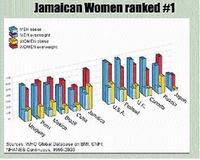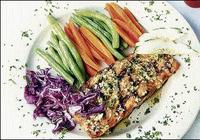Dr Anthony Vendryes, Contributor

Vendryes
In the past, the word 'malnutrition' conjured up visions of the thin, emaciated bodies of men, women and children who do not have enough food to eat. Now, the picture is totally different. Fat, bloated bodies - obe-sity is the malnutrition of today. The World Health Organisation (WHO) has coined the word 'globesity' to describe this global disaster. In their recent weeklong documentary, the BBC reported that obesity rates are increasing in every single nation on planet Earth. Even more distressingly, it is actually spreading faster in poor and developing countries than in the industrialised world.
Over a decade ago, WHO data showed Jamaica as being the fattest nation in the developing world. The impact of the fast- food industry and poor lifestyle habits are considered key factors.
I have been warning Jamaicans of this impending disaster for close to 20 years and I applaud the recent highlighting in The Gleaner of Jamaica's nutritional woes by other experts in the field. However, their appeal to our government for it to solve this problem for us is well-intentioned, but na´ve.
Yes, the Government must place more focus on better nutrition and healthy lifestyles. But I cringe with embarrassment were I to compare the Ministry of Health's financial resources for nutritional and healthy-lifestyle promotion with the fast- food industry's massive advertisement budget.
IT IS SIMPLY NO CONTEST!

The wholesale, unabated consumption of unhealthy fast food is not an accidental or unexplainable phenomenon. It is the result of the deliberate efforts of major economic forces using modern technology, sophisticated marketing and powerful advertising techniques.
To succeed, we need to fight fire with fire. I have found a more effective way to halt the 'Globesity Epidemic' by using the same tools - technology, marketing and advertisement.
HEALTHY FAST FOOD
In the early days of the space race, NASA scientists developed the technology to provide the astronauts with a nutritionally perfect meal in a drink. Technically referred to as a meal-replacement supplement (MRS), it is now popularly called a shake.
In 1980, an American nutritional company introduced the NASA-originated concept to the public for weight management and good nutrition - they made space-age nutrition available to the man in the street. Over 50 million people have now successfully used this approach and in the past 15 years, right here in Jamaica, I have used their MRS to assist thousands of people lose weight in a healthy way.
An MRS is a convenient portion-controlled meal usually containing less than 200 calories. This helps you safely reduce your total calorie intake and thus lose weight without compromising your nutrition. The best shakes are low in fat and sugar, but generous in healthy protein, various vitamins, minerals and fiber. High- quality shakes are very nutrient-dense and calorie-poor, and are really the healthiest fast food money can buy.
Do meal replacements work? A good answer comes from a study published in the American Journal of Clinical Nutrition. Researchers in Germany assessed the effects of MRS on weight loss in 100 obese patients who were assigned to one of two groups. Group one ate a low-calorie diet consisting of conventional foods. The second group used MRS. Two years later, the average weight loss in the group using the MRS was twice that of the group relying on conventional methods.
Another study, presented at the annual meeting of the North American Asso-ciation for the Study of Obesity in Fort Lauderdale, showed that people who followed a meal-replacement plan for 10 years weighed, on average, about 33 pounds less than people who did not use a meal-replacement plan.
RESULTS OF STUDY

A diet rich in soy, fish and vegetables reduces a woman's risk of breast cancer. - File
The results of these studies suggest that meal replacements are an effective weight-loss strategy in both the short and long term. Approval ratings of MRS have been high, with very favourable scores for appetite satisfaction and taste.
Meal replacements help people lose weight by providing a controlled amount of calories and fat in a prefixed portion. They can simplify meal planning because they are convenient - easy to purchase, easy to store, and easy to prepare. They are also reasonably priced, usually costing less than the meal they replace. Meal replacements simplify decision making about what to eat and reduce exposure to tempting foods that might cause overeating.
For weight loss, I recommend replacing two meals per day with shakes, along with one regular healthy meal. Later, replacing only one meal per day will maintain weight. This is how I have effortlessly kept my own body weight optimal for the past 15 years.
Losing weight requires a change in behaviour. Research shows that behaviour modification is most effective where the change is simple to do and the individual has easy access to a support system. Such an approach has been very success-fully developed in Mexico, where they are faced with a similar dilemma of obesity and malnutrition in a social and economic environment similar to that in Jamaica.
It uses a concept called nutrition clubs. A nutrition club (NC) is a community-based faci-lity with the motto 'where friends of good nutrition meet'. They are located in homes or commer-cial spaces and are operated by wellness coaches. Friends, fa-mily and community members are invited to visit and become members of the NC. There, they receive a highly nutritious meal in the form of a shake and cup of a special green tea. There is also social interaction, healthy-lifestyle information, fun and loving support. For this, they pay a daily membership fee to the club of less than US$4. Started originally by Mexican doctors, the results have been spectacular. Well over 20,000 NCs exist in Mexico today and these micro-enterprises market over US$50 million of these nutritional meals each month.
In 2004, a group of Jamaican wellness coaches and a physician travelled to Mexico to study the nutrition club phenomenon. They were so overwhelmed and impressed by what they saw that they returned to Jamaica and implemented the strategy. Today, there are well over 500 NCs scattered over the length and breadth of both urban and rural Jamaica. The health benefits that the members of these clubs report are simply amazing. I travel the length and breadth of the island visiting these clubs and am moved to tears by the stories that I hear.
PERSON-TO-PERSON ADVERTISEMENT
Without a huge budget for advertising and public education, the best way to promote weight loss and healthy lifestyles is through committed individuals who walk the walk and talk the talk. Motivated by their own success, they effectively spread the message, one person at a time. These people receive basic training as wellness coaches and make a successful profession of assisting others to lose weight. There are now thousands of these coaches working around the island.
As a team, our mission is to take the story of good nutrition, person by person, family by family, community by community, all over Jamaica and all over the world. I believe that this is the strategy that will save our country from the glo-besity epidemic that threatens to destroy us.

